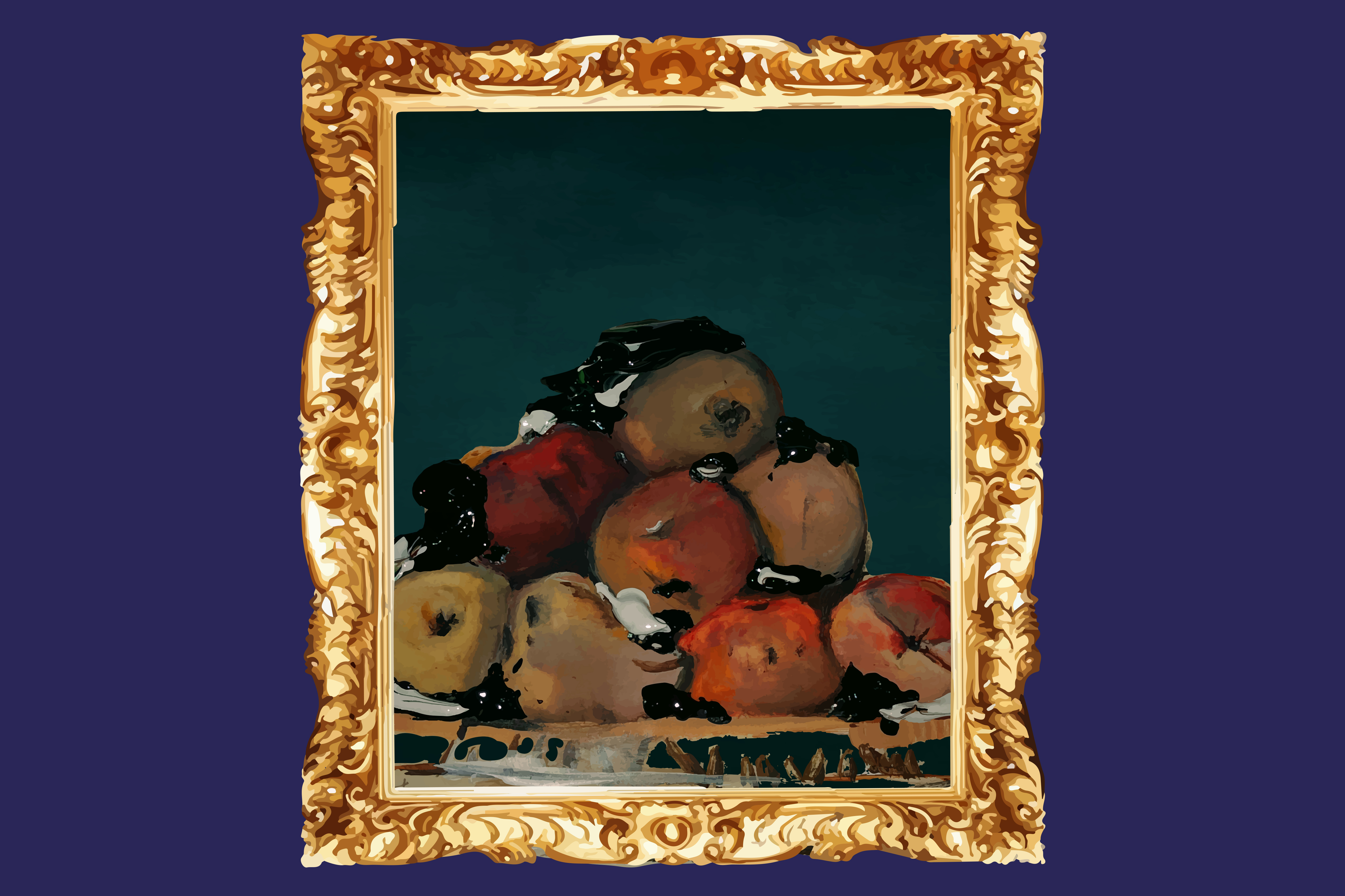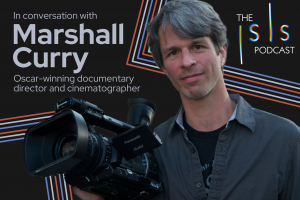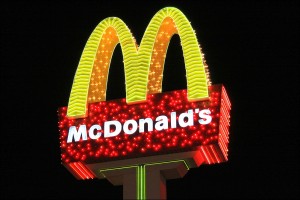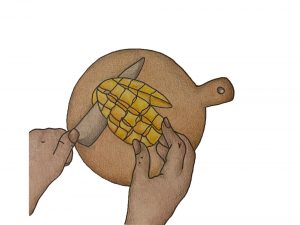
Waste Not, Want Not
by Barnaby Pite | September 9, 2019
Just over halfway through a ten-hour shift waiting tables at a fancy wedding, I tapped out for a few seconds in the men’s bathroom. Kneeling down on the tiles, I took a few deep breaths, counting them, and tried to stop retching.
A glance into a green food waste bin had prompted my exit. It had been a particularly wasteful shift; we’d been forced to throw away several trays of freshly- cooked mashed potato with salmon and many of our guests had turned down our chicken curry, naan bread, and yoghurt. Imagine how that would smell in the heat of a busy kitchen. Imagine how it would look.
Statistics are the wrong way to think about food waste. A better way to conceptualise the reality is to imagine the world’s largest stadium filled right up to the roof with food waste and then to realise that that’s how much food the US throws away – in a single day. The global scale of food waste is hard to comprehend or visualise. A third of all food produced globally is never eaten. An area larger than China cultivates food that isn’t used. Uneaten waste produces more CO2 than all of the world’s countries except the US and China.
Working as an agency waiter during the vacations, I’ve seen firsthand how endemic this problem is in the hospitality industry. Commercial kitchens hugely overproduce food (mostly as an insurance measure – nothing is worse than stocks running dry). A shameful proportion of all this produce is never eaten, and binned. Customers will buy huge plates of food, either for themselves, or, more commonly, for their children, only for fried chicken, chips, or curries to be binned a few moments later, totally untouched. In one shift, I was given the job of clearing bins when they filled up. There are few things as galling as looking into a skip of black bags and throwing in yet another one, full, all of it about to rot.
I have asked myself several times if it is ethically defensible for me to be knowingly and needlessly throwing away food. I know how harmful my actions are, but I do them anyway in my capacity as an employee. Does that make me complicit? It is difficult to watch good food go to complete and abject waste, knowing the extent of food poverty in the UK and internationally, but it is hard to shirk something I am paid to do. Clearly, there are more important things than holding down a crap job, but it’s never easy to take a stand.
I threw away most of a side of beef on a shift around Easter. The agricultural and environmental effort it takes to produce a single tray of beef is huge; land needs to be cleared for livestock and for the grain that feeds them; water procured for irrigating feed and raising animals. The livestock needs to be nurtured to maturity and then slaughtered. That meat is then processed, oil is drilled, refined, and piped to fuel the boats or planes that transport the meat, and then the meat is cooked and served. But if someone doesn’t fancy their beef and it ends up in the bin, then all that effort – expensive not just financially but also in terms of the damage it does to the planet – proves fruitless. The meat rots away, and we know the rest of the story.
We are undoubtedly the first society in history that is able and willing to throw away this much food. For millennia, humans lived by subsistence: if on the off-chance you managed to kill an animal, you damn well ate the whole thing. A consequence of this history is that we have become infatuated with the sensual experience of plenty. We love the toxic appeal of an all-you-can-eat buffet, despite the greasy food and the smell. All of us have felt the odd rush of an overfull fridge. An old part of our brain remembers a time when food was hard to come by; it’s overwhelmed by all the produce we see around us on the shelves in Tesco and it tells us to buy food we know we don’t need. Another loaf of bread, chips for our wailing child, old broccoli, more for the way it looks than for anything else. This is a part of our brain we need to listen to less – we need to be more careful, and hold back.
We make decisions like this in but a fraction of a second. The point of fast food is that the customer goes from hungry to satiated in a matter of moments; that’s where the real problem lies. There is no such thing as ‘fast food.’ The consequences of buying a Big Mac, eating half of it, and throwing it in the bin may not feel like much as you’re doing it but you’re not only throwing away a Big Mac – you’re throwing away the water, grain, and land it took to feed and graze the cattle, the oil it took to fly it across the world and to fry it, and all of the human labour that went into putting it together. The rise of fast food and food waste more generally is symptomatic of a detachment from the physical and economic realities of food – what it actually takes to raise a pig or bake a loaf of bread. There is, somewhere in the background, a deep disregard for the effort that goes into putting together a meal. I don’t want to sound Victorian, but ‘waste not, want not’ is a long-established, time-honoured sentiment and for hundreds of years, people have said grace before they eat, giving thanks (albeit in an explicitly religious context) for all the time and care that goes into a meal. We’ve lost a sense, deep down, of what food is and what it takes to make it. We need to redevelop an appreciation of that which is precious about food and the danger of wasting it. Of course, this needs to happen alongside more practical measures for reducing food waste: food-cams, programs linking those in need to those who have more than enough, and campaigns lobbying catering managers and hospitality executives to produce more sparingly. We need to remind people that food is valuable, that it always has been, and that wasting it is an insult to thousands of hours of labour.
What’s more, it has been well-proven that large multinationals could implement schemes which rapidly and substantially reduce food waste. Pret A Manger provides three million meals a year to homeless people, free of charge, ensuring that unsold food is eaten and doesn’t rot away. Komal Ahmad, a social entrepreneur working in the US West Coast, founded startup Copia PBC, which aims to provide an online platform linking businesses and individuals with a surplus to people who are in need. According to Ahmad’s LinkedIn, the project has saved two million tons of edible food from landfill and will feed over three million people this year.
The really frustrating thing about food waste is that it is, fundamentally, an entirely solvable and preventable problem. In many places, there is clear demand for food that, elsewhere, is in oversupply – look around Oxford and you’ll see hungry people without a roof over their head. But people – consumers, chefs, hospitality managers – don’t have the energy or the inclination to join the dots. I thought seriously about what it would take for my workplace to donate their leftover food to local homeless shelters at the end of the workday: it wouldn’t take much. What it would take is a serious, concerted, considered effort. But in the hospitality industry – with notoriously tight margins, stressed workers, and unstable and unpredictable market conditions – management teams can be forgiven for prioritising other questions, even if making that decision does substantial environmental damage.
World hunger is not a problem of scarcity. Far from it. If I’ve learnt anything in hospitality, it’s that humans are producing more than enough food. The problem, as is often the case, revolves around logistics. The problem is administration, management, economics – it’s about joining the dots. In simple terms, this is a problem we really need to fix. Food is precious, in terms of land, labour, and resources. It’s worth its weight in gold. Throwing away that value should hurt as much as losing a fiver by mistake. Until more of us come to terms with the necessity of that pain, people all across the affluent countries are going to keep on throwing away more food than anyone can afford. I don’t like how that story ends. ∎
Words by Barnaby Pite. Artwork by Anna Covell.




